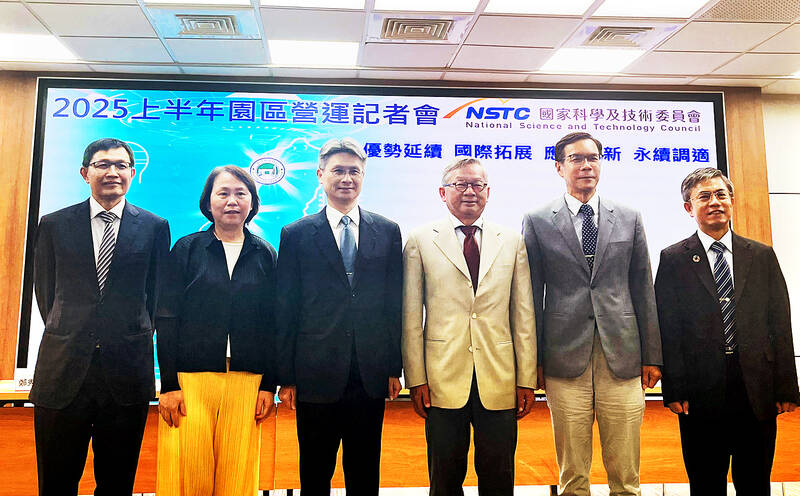Taiwan Semiconductor Manufacturing Co (TSMC, 台積電) is to start building a new 1.4-nanometer fab next quarter with an anticipated production value of up to NT$500 billion (US$16.49 billion), the Central Taiwan Science Park Bureau said yesterday.
TSMC, the world’s biggest contract chipmaker, is working at full steam to push forward the construction of its new factories at home, rather than taking a slower approach as some media speculated, bureau Director-General Hsu Maw-shin (許茂新) said.
“Everything is on schedule. TSMC plans to start construction in the fourth quarter. It is planning a detailed construction schedule and arranging contractors to build the fab,” Hsu said.

Photo: CNA
Since TSMC is to utilize more advanced process technology than the 2-nanometer technology as originally planned, the new fab is expected to generate a production value of NT$500 billion, higher than an earlier estimate of NT$485.7 billion, Hsu said.
The fab is to create about 4,500 jobs, he added.
TSMC in May said it expected to start building a new fab, called Fab 25, in Taichung, with an aim of producing advanced chips in 2028 utilizing 1.4-nanometer technology, the most advanced technology.
The chipmaker plans to start volume production of 2-nanometer chips next quarter at fabs in Hsinchu and Kaohsiung, and produce 1.6-nanometer chips in the second half of next year at fabs in Kaohsiung amid robust demand for artificial intelligence and high-performance computing.
TSMC is also expected to build an advanced technology facility in Tainan’s Shalun District (沙崙), Southern Taiwan Science Park Bureau Director-General Cheng Hsiu-jung (鄭秀絨) said.
The chipmaker’s capacity expansions for advanced packaging technology in the Southern Taiwan Science Park’s (南部科學園區) campus in Chiayi County’s Taibao City (太保) are at full swing, Cheng said, refuting media reports about a sudden halt.
The company is even trying to pull ahead of the construction schedule, she added.
Separately, companies based in the nation’s three major science parks are expected to generate record-high revenue of NT$5.5 trillion this year, National Science and Technology Council Minister Wu Cheng-wen (吳誠文) said at a news conference yesterday.
That would represent annual growth of 15.5 percent from NT$4.76 trillion last year.
Wu attributed the double-digit growth to the semiconductor industry’s strong growth momentum.
During the first half of this year, semiconductor companies in the science parks have seen revenue soar 34.33 percent annually to NT$2.27 trillion, council data showed.
Semiconductor companies were the major revenue contributors, making up 83 percent of the overall revenue of NT$2.74 trillion made by companies in the science parks during the first half.
Producers of computers and related components saw revenue sink 28.58 percent year-on-year to NT$89.93 billion in the first half, as some firms allocated production overseas in a bid to address geopolitical tensions and US tariffs, the council said.

Sweeping policy changes under US Secretary of Health and Human Services Robert F. Kennedy Jr are having a chilling effect on vaccine makers as anti-vaccine rhetoric has turned into concrete changes in inoculation schedules and recommendations, investors and executives said. The administration of US President Donald Trump has in the past year upended vaccine recommendations, with the country last month ending its longstanding guidance that all children receive inoculations against flu, hepatitis A and other diseases. The unprecedented changes have led to diminished vaccine usage, hurt the investment case for some biotechs, and created a drag that would likely dent revenues and

Macronix International Co (旺宏), the world’s biggest NOR flash memory supplier, yesterday said it would spend NT$22 billion (US$699.1 million) on capacity expansion this year to increase its production of mid-to-low-density memory chips as the world’s major memorychip suppliers are phasing out the market. The company said its planned capital expenditures are about 11 times higher than the NT$1.8 billion it spent on new facilities and equipment last year. A majority of this year’s outlay would be allocated to step up capacity of multi-level cell (MLC) NAND flash memory chips, which are used in embedded multimedia cards (eMMC), a managed

CULPRITS: Factors that affected the slip included falling global crude oil prices, wait-and-see consumer attitudes due to US tariffs and a different Lunar New Year holiday schedule Taiwan’s retail sales ended a nine-year growth streak last year, slipping 0.2 percent from a year earlier as uncertainty over US tariff policies affected demand for durable goods, data released on Friday by the Ministry of Economic Affairs showed. Last year’s retail sales totaled NT$4.84 trillion (US$153.27 billion), down about NT$9.5 billion, or 0.2 percent, from 2024. Despite the decline, the figure was still the second-highest annual sales total on record. Ministry statistics department deputy head Chen Yu-fang (陳玉芳) said sales of cars, motorcycles and related products, which accounted for 17.4 percent of total retail rales last year, fell NT$68.1 billion, or

In the wake of strong global demand for AI applications, Taiwan’s export-oriented economy accelerated with the composite index of economic indicators flashing the first “red” light in December for one year, indicating the economy is in booming mode, the National Development Council (NDC) said yesterday. Moreover, the index of leading indicators, which gauges the potential state of the economy over the next six months, also moved higher in December amid growing optimism over the outlook, the NDC said. In December, the index of economic indicators rose one point from a month earlier to 38, at the lower end of the “red” light.